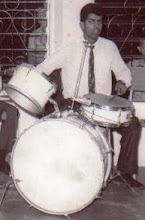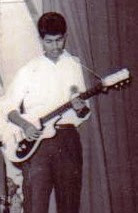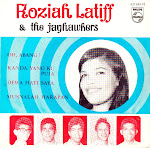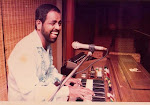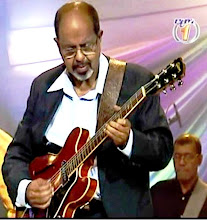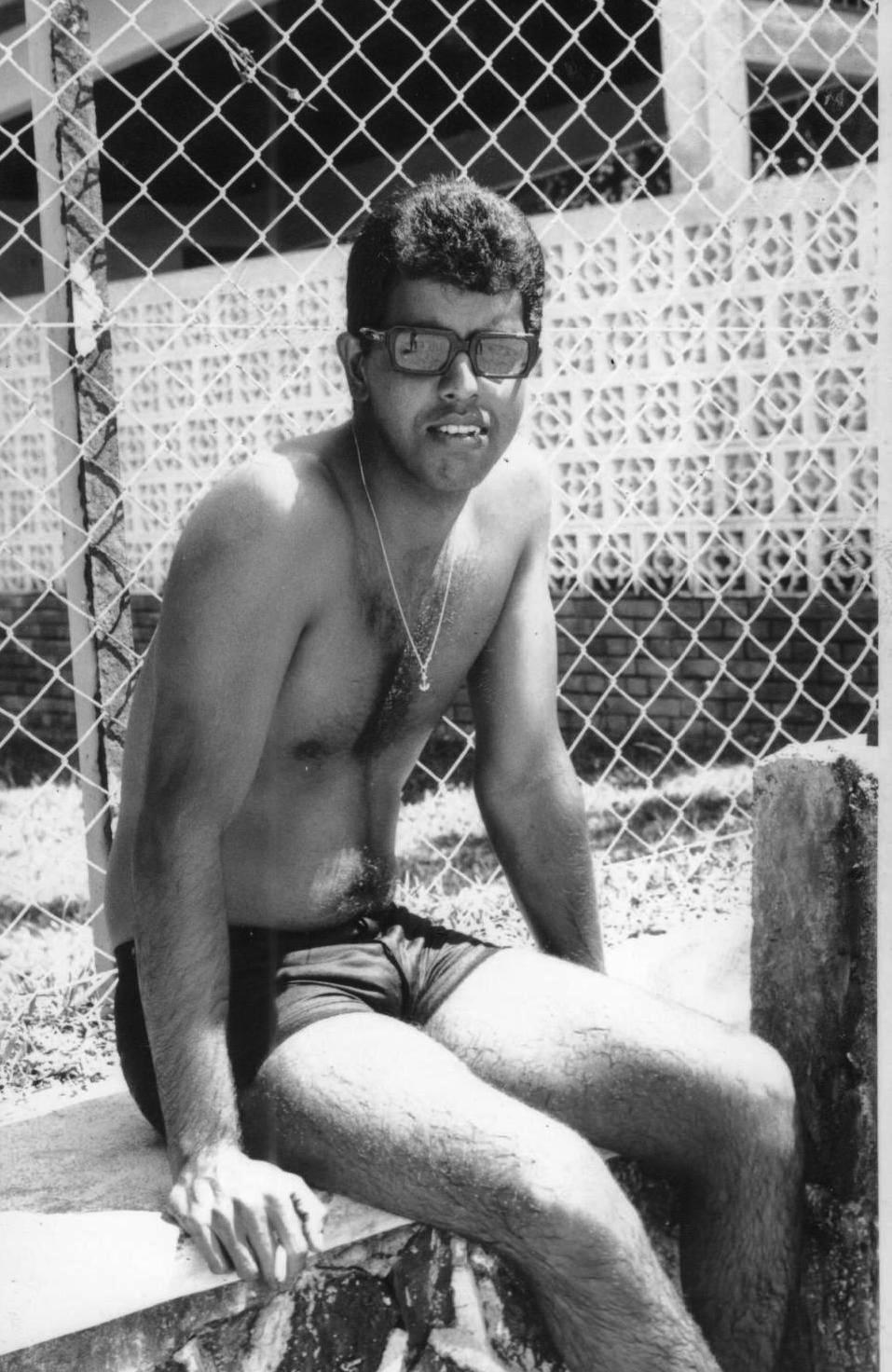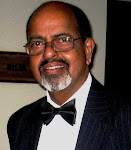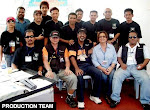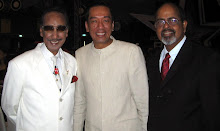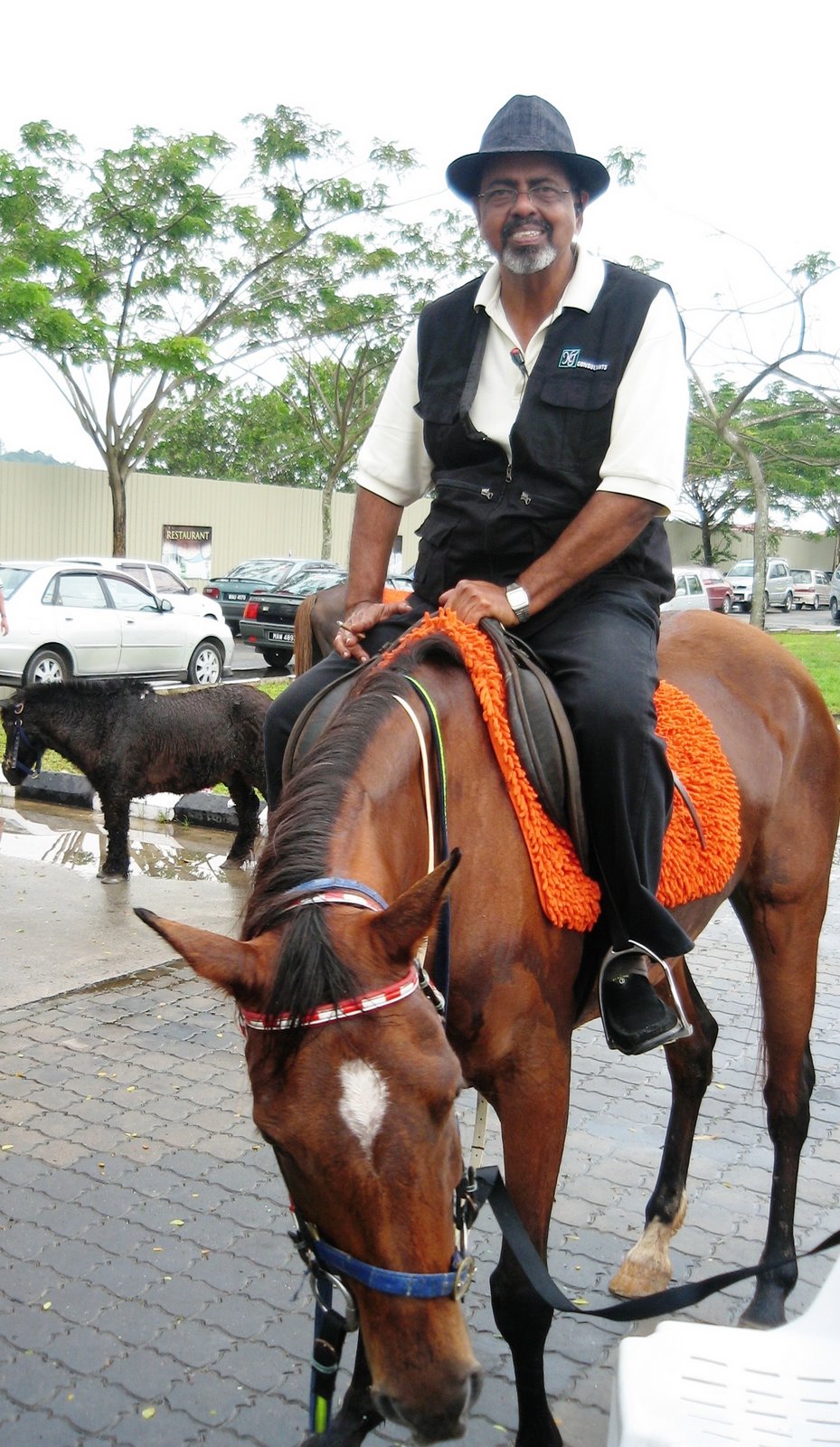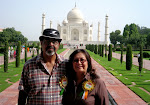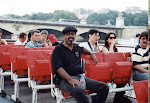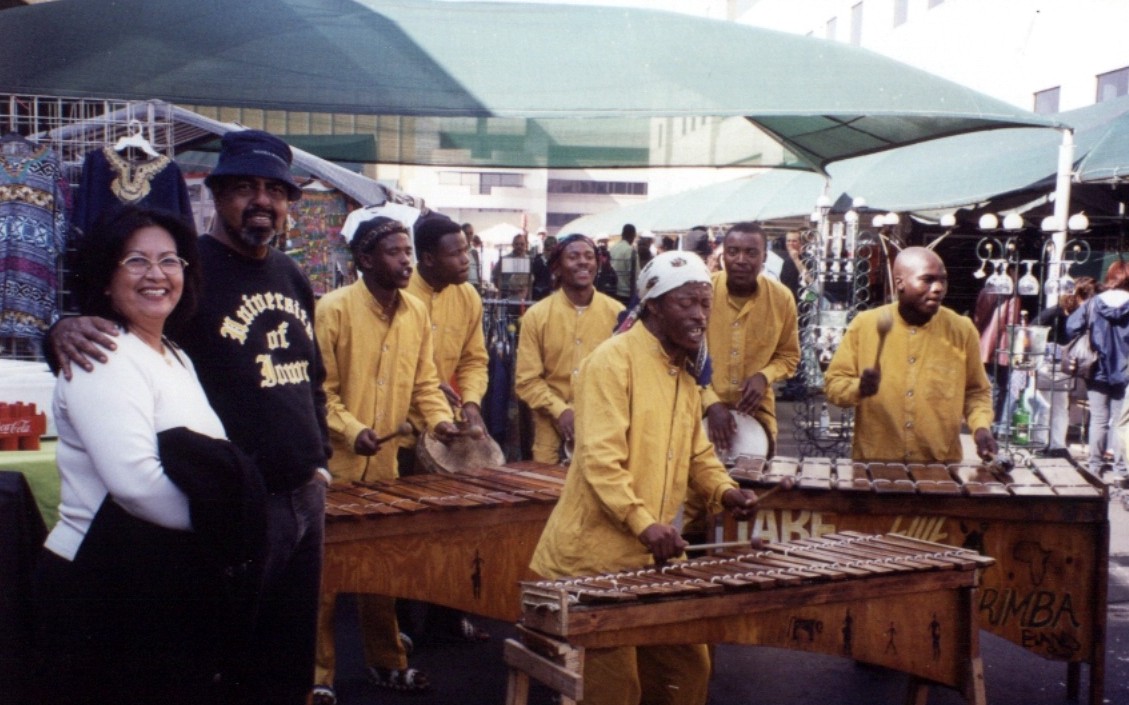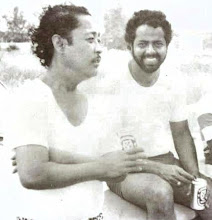 The Twilights Rocking Away in 1962
The Twilights Rocking Away in 1962 1st non-Malay Recording Artiste in Malaysia -1965
1st non-Malay Recording Artiste in Malaysia -1965The Progenitors of Popular Music in Malaysia - The Kugiran Brigade of 1960's - By Johami Abdullah @ Joe Chelliah
There are no books that have been specifically written about the history and evolution of music in Malaysia. People who are qualified and should be doing it are apparently not yet motivated enough to do so or are just not curious enough. This article aspires to put on record a group of people who unconsciously have played a significant part in not only charting music directions in Malaysia but also actually being progenitors of the Malay music industry itself in Malaysia and kicking it off in the 1960's.
I refer to, and pay tribute, to my fellow musicians and singers of the mid- 1960’s – 1969 who just performed for the love of music without any proper musical knowledge, equipment, guidance, education nor parental support or encouragement. I refer to them as The Kugiran Brigade. Without realizing it, these forgotten musicians and singers have kicked off the course of popular music in this country. We were the first rockers in Malaysia. We played rock without any gadgets. Today rock music has "progressed" aided by technology and is, most of the time, only associated with distorted lead guitar sounds and screaming vocals - no more of that original clean rock as was performed by B.B. King or The Shadows. The kugiran bands are from that generation.
Till about the mid 1960s, Malay popular music was being produced and introduced through the medium of movies – a trend and concept copied from Indian movies, which is still very firmly entrenched and prevalent in India. In itself, there is nothing wrong or right about it except that the lyrical content could not depart from but must be in concordance with and subservient to the movie script and story.
If we are to accept the popular definition of rock music as music that it is guitar driven, then surely the kugiran musicians of the early 1960’s were the original “rockers”. As early as 1960 the kugiran made its appearance in Malaysia. This writer himself was a bongo player who progressed on to be a drummer in such a kugiran called The Hap Cats in 1960. The standard instrumentation in such an ensemble was three electric guitars (lead, bass and rhythm) and a drum set. These “electrified” guitar bands were much louder than the earlier music groups called skiffle groups. The guitars that were used were electric guitars in the sense that separate “alien” pick-ups were attached to normal acoustic guitars. Normal six stringed guitars were used to play the bass line till about 1963 or so when proper four-stringed bass guitars became available in Malaysia. The first bass guitars to arrive in Malaysia were the violin shaped ones like the one used by Jet Hariss of The Shadows.
These kugirans effectively replaced two types of other small Western styled music groups of the 1950’s into oblivion. One was the called a “skiffle group” – a type of Dixieland and Latin American influenced musical group that performed with acoustic guitars and improvised instruments such as wash-boards, tea box basses, bottle top jingles and what not that played mostly popular Western music of the time. The other type of ensemble that also became extinct was from the Malay side of the divide – the P. Ramli type of combo with basic instrumentation of an accordion, trumpet, saxophone, guitar, acoustic bass, bongos, maracas etc.. – the type seen in old Malay movies of the time in cabarets and Malay weddings of the time. The kugirans also gradually replaced the jazz trios and quartets (mostly in K.L., Penang and Singapore) in hotels and club circuits. It is said that P. Ramlee himself baptized these early rock groups with the term kugiran.
These kugirans served a very important social role in those days by enhancing birthday parties and weddings (including those in the kampongs and estates). The better kugirans progressed to performing Western music for the British army in the many camps to be found all over Malaya/Malaysia of the period.
Sound recording studios were set up separately from the film world in Singapore during the early 1960’s and later on in the mid-60’s in Kuala Lumpur. The first kugirans that started recording in 1965 and became big household names were all from Singapore. The kugirans such as A. Ramlie & The Rhythm Boys, Eddie Ahmad & The Antartics, Jefridin & The Siglap Five were the early leaders in this new genre of Malay pop music that effectively separated popular music from the silver screen of the P. Ramli and R. Azmi era. Soon kugirans began to mushroom and spill over across the Causeway into Malaysia as the trend got picked up. A peripheral outcome was the proliferation of the mostly Chinese recording companies and studios in Malaysia. The music pirates too started their activities around 1966 or so and their presence since then has long outlived the kugirans.
Among the first of such famous kugirans in Malaysia itself at that time beginning around 1965 were L. Ramli and The Teruna Ria, Roziah Latiff & The Jayhawkers (my band) and A. Halim & D’Fictions. The Jayhawkers was the first non-Malay kugiran to perform and record commercial Malay music. This kugiran musical style as well as the number of singers grew very rapidly with pop concerts happening all over Malaysia and Singapore complete with screaming fans and autograph signing. But it all ended in a very short-lived period of glory around 1969. This was in no small part due to the hordes of more popular Indonesian kugirans and singers who slowly but surely packed off the Singaporean and Malaysian brigade of kugirans and their singers to oblivion as Indonesian songs were given more and more air time by the radio stations in Singapore and Malaysia due to, perhaps, their better quality and appeal. Indonesian singers like Ernie Djohan and Lilis Suriyani led the pack.
All said and done, the Malay pop industry was born and remained somewhat dazed for a couple of years until 1970. Then some wise soul at Radio Television Malaysia initiated an affirmative policy for Malay pop music either knowingly or unknowingly. Indonesian songs were “gummed” i.e. banned unofficially over Radio Malaysia and denied airplay thus indirectly giving priority to Malaysian pop music. Sadly by then all the kugiran bands had gone out of style and the practioners had moved on or gave up. Then the next new phase in the Malay pop industry dawned and began to pick up from there. Singers of the 1970’s like D.J. Dave, Uji Rashid and Dahlan Zainnudin started off this 2nd phase in the development of Malay pop music.
Today's practioners of popular music are quite unaware of the kugiran brigade whose music is now posthumpously termed "pop yeh yeh" music which is aired almost daily over RTM's Radio Kelasik in nostlagia particularly for the over-fifty year old listeners - ministers and policy makers included. Some TV programs too give a little air time. Musicians from this era are beginning to be recognized and even given Dato' titles for their contribution - high time I might add.
MALAYSIAN & SINGAPOREN POP YEH YEH RECORDING ARTISTES OF THE TIME
D 4'EVER (D Hatta)
D'ACROBATS (Lay Sabrie, NA Rose)
D'ANTARTICS (Ahmad Jais, Eddie Ahmad,M Bakri)
DENDANG IRAMA (Jaafar Osman)
DENDANG PERINDU (Ahmad Jais)
DENDANG SUKMA (A Ibrahim)
DESA BERSAUDARA (Eliza Ariffin)
D'FICTIONS (A Halim)
D'IRAMA (J Ismail)
D'PIONNER (Asmah Atan)
DULCETT BOYS (Maimon Hussein)
IMPIAN BATEKS (Ruddin Al Haj)
IRAMA PERINDU BRUNEI (Noorasiah A Hamid)
KUGIRAN THE PEELS
LES COASTERS (M Fadhil, Orked Abdullah)
LES DIGGERS
LES FAIRUZ (Ahmad Z)
LES FENTONES (A Karim Jais, Fatimah HS, A Manaf, A Azman, M Ahmad)
LES FLINGERS (A Zanne)
LES JOLLY JETS (Zaino Mum)
LES KAFILAS (J Rukimin, Hasnah Haron)
LES REMAJA (M Said, Maimunah I)
LIMA BERSATU (Afida Es)
ORKES IRAMA RIA (Suleiman Bakar)
ORKES NIRWANA (A Rahman Hassan, Azizah Mohamad, Afida Es, M Osman)
ORKES TERUNA BARU (Muzaris Wan)
ORKES TERUNA RIA (L Ramlee)
PANCHA SURYA (Rahmat Sabirin)
PANCHARAGAM RAMLIE (A Ramlie)
RAYUAN PENGEMBARA (Taufik Hj Ali)
RHYTHM BOYS (A Ramlie, Ramlah Aziz, A Rhyme, Adnan Othman, Shaari Omar, S Mariam, M Amin)
SAPTA DAHLIA (S Jamelah)
SRI ARJUNA (S Jibeng, Latifah)
THE BARONS
THE BEATS (S Agil, Abby Abdullah)
THE BLACK JETS (Ghazali Ghani)
THE BLUE BEATS (Normah Zainal, A Wahid, Zainab Selamat, Fatimah Wari, Salimi Hj Omar, Abdullah Din)
THE BRAILLE BOYS (A Kadir Jailani)
THE CASTLERS (Norashikin)
THE CLANS (Fatimah M Amin, A Anis, Afida Es, M Osman)
THE CLICK FOUR (Jaafar O)
THE CLIFTERS (June Abdullah, Rikineo Badjuri)
THE DREAMERS (Ainie Hamid)
THE FABIAN'S BOYS (Norfaizah, M Wari)
THE FABULOUS FLAME (JM Noor)
THE FAMILIES (M Aminuddin, A Dayang, F Abdullah)
THE FYREBIRDS (Siti Zaiton)
THE GUYS (Ismail Haron)
THE HAWKS (Bakar Hamid)
THE HONEY BLUES (G yusof, Muzariz Wan)
THE HOOKS (A Romzi)
THE JAYHAWKERS (Rodziah Latiff)
THE JEJAKA (Ismail Kasdi)
THE JOLLIES (A Dayang)
THE KINGSTONS (S Mona Rita)
THE MIXTURES (Zainal Omara)
THE MODS (Ena S)
THE NIGHT SHADOWS (M Noor)
THE O.K BOYS (Mat Sentol)
THE PRETENDERS (R Ismail)
THE QUESTS
THE REMAJA BOYS (S Salihin, R Ismail)
THE ROLLIES (Alina Rahman)
THE SAND BLUES (Dayangku Aminah, Hussein Ismail)
THE SANGAM BOYS (Halim Yatim, S Roha, R Selamat)
THE SIGLAP FIVE (Jeffrydin, P Rosnah)
THE SKELETONS (Hassan Sani)
THE STARLITES (Noorasiah)
THE STRANGERS (A Rahman Onn)
THE SWALLOWS (Kassim Selamat, Ahmad Daud)
THE TERUNA (M Rahmat)
THE TERWELLOWS (Sanisah Huri)
THE THUNDERBOLTS (Aishah Tuah)
THE TORNADOES (Kamsiah M Ali)
THE TWILITTES (Zam Zam)
THE VULTURES (D Sulaiman, Ainie Hamid)
THE WANDY FIVE (Rahim Ali)
THE WISMA (Jaafar Ahmad, J Kamisah, Ungku Fadillah)
THE YOUNG LOVERS (M Ishak)
THE ZARAKS (Nadar, Ida)
THE ZURAH (M Shariff)
ZAENAL COMBO (Ernie Djohan)



